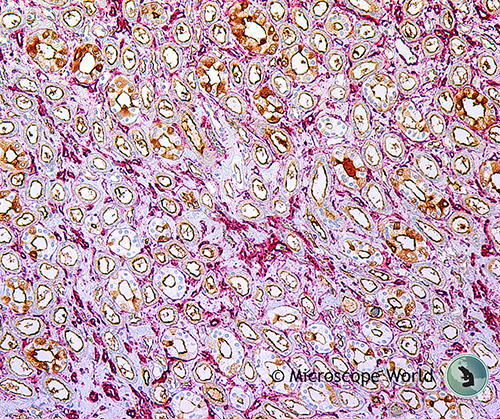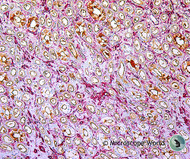Dog Kidney Disease Under the Microscope
Oct 24th 2017
Kidney disease affects an estimated 10 percent of dogs in their lifetime. There are a number of causes of kidney disease in dogs. Below are some of the diseases that can cause kidney disease that veterinarians may test for.
Glomerular Disease: The glomerulus is a kidney filtration mechanism. If the kidney filters are damaged it can create chronic kidney disease that makes a dog feel sick. Glomerular disease can be caused by an infection such as lyme disease or cancer.
Nephrolithiasis: Nephro means kidney and Liths means stones. In dogs, kidney stones do not cause dogs too much pain, but they can still cause a blockage within the kidneys that can become serious. Kidney stones can be caused by a bacterial infection, genetics or a disease that altered blood or urine.
Pyelonephritis: When kidney tissues in dogs become infected with bacteria or fungal organisms (this is rare), the vet can often help the dog by identifying this problem quickly. Pyelonephritis is one of the kidney diseases that may have a good outcome so often vets are on the lookout for this infection. A bacterial urine culture can verify the infection and identify an antibiotic that might work for healing the dog.
Tubulointerstitial Disease: Chronic kidney disease can be caused by damage or inflammation to the kidney tubules and supporting tissue. This often does not have an identifiable cause and therefore typically no treatment. This type of kidney disease can only be confirmed with examination of a kidney biopsy under the veterinarian's microscope.
Kidney Blockage: If kidney stones fragment and are carried along with urine into the ureter, a blockage can form. If a complete blockage takes place the dog will be unable to urinate, causing the kidneys to swell. With a lot of pressure the kidneys will experience hydronephrosis (enlargement) and can become permanently damaged.
Leptospirosis: This is a bacterial infection that causes kidney disease in both dogs and humans. This infection is highly treatable and a quick detection can lead to a better outcome for your dog. Infection is caused by contact with urine or other bodily fluids.
Cancer: Kidney cancer is not common in dogs. In the rare case of kidney cancer in dogs, treatment is limited. Isolated tumors affecting only one kidney can be removed or if the cancer is benign or has not spread the outcome is positive. A dog only needs one good kidney to live a normal life. A biopsy will need to be examined under the microscope in order for a correct cancer diagnosis and in order for the veterinarian to lay out proper treatment plans for healing.
Toxins: Many household items can harm dogs including foods such as grapes, raisins, some beef jerky, medications including aspirin, prescribed medication, and of course car products such as antifreeze. If you believe your dog may have ingested toxins contact ASPCA poison control at 888-426-4435 or the pet poison helpline at 855-764-7661 immediately.
Amyloidosis: Dogs with amyloidosis lose function of organs including the kidneys because protein deposits replace the normal tissue. Amyloid deposits can not be cleared away and the kidney tissue that is lost can not be replaced.
Hereditary Problems: Some purebred dogs have kidney disease that runs in their breed. Young dogs can fail to develop healthy kidneys, or some dogs might develop enlarged kidneys.

This image is a dog's kidney biopsy captured under a veterinarian's microscope.
Some common signs of kidney problems in dogs include change in the amount of water they drink, change in amount of urine produced, depression or decrease in appetite.
If you are worried your dog might have a kidney problem, contact your local veterinarian for testing.
For more information on veterinarian microscopes contact Microscope World.





